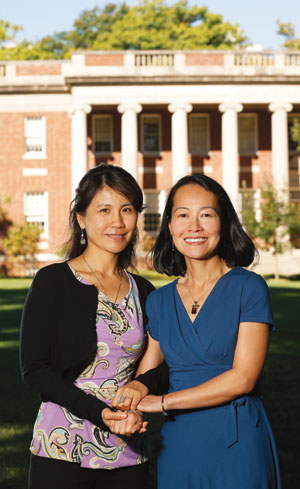
With a donation from YingLian Helen Du, a native of China who splits her time between Beijing and Nashville, Peabody has established the Peabody-Asia Center for Education or PACE Fund. The new funding will allow Peabody to expand existing programs and partnerships already in place in China and to explore new possibilities. Recently, the Peabody Reflector spoke to Du and her college friend, Xiu Cravens, Peabody’s associate dean for international affairs, who will direct projects for the fund with guidance from the Peabody Dean’s Office and the Vanderbilt International Office.
Reflector: Why did you decide to give the gift that established the Peabody-Asia Center for Education (PACE) Fund for International Affairs?
Helen Du: It started with something personal. In the last few years my husband and I have been trying to find a suitable learning environment for our son, Daniel, who was struggling in school. After some very challenging and frustrating attempts in China and at a boarding school in New England, it was the expert advice from Peabody’s faculty and their referral to Currey Ingram Academy’s diagnostic center that helped us understand Daniel’s strengths and needs. Today he is an honor student with blossoming interests in arts, interior design and technology.
Even before I came to Nashville, I got to see Peabody’s “magic” at work. Through keeping in touch with Xiu in the last few years, I witnessed important ties being established between Peabody and universities in China so that we could work together to make education better for both of our countries. Each time Xiu visited China with Dean Benbow and Peabody faculty, I volunteered whenever I could. There is so much to be done. As more of us see how important the U.S.-China collaboration is to our future generations, I hope my gift can start a fund that can grow. I am thankful that I can be a part of it!
Reflector: What does Peabody hope to accomplish with the PACE Fund?
Xiu Cravens: We hope to use it as seed funding in three main areas: to assist Peabody faculty in exploring strategic partnerships in educational research with Chinese universities; to identify viable professional development programs such as the Principals’ Leadership Academy in Nashville and Peabody Professional Institutes; and to support university-wide collaborations in China that enhance and internationalize academic programs and study-abroad opportunities.
Reflector: What kinds of partnerships or projects between Peabody and Chinese universities do you see coming to fruition as a result of the PACE Fund?
Cravens: In the last three years, Peabody has established formal partnerships with major educational institutions and teaching universities in the Asia-Pacific Region, including Beijing Normal, East China Normal, South China Normal, Nanjing Normal, Hong Kong Institute of Education and National Taiwan Normal. We now have ongoing research collaborations in the areas of school leadership development, mathematics curriculum and pedagogy, neuroscience and educational psychology, parental involvement and social context, and community psychology and development.
Special education and gifted education are two new areas in which Peabody’s expertise may make a strong impact as China strives to build a more knowledge-based and equitable economy and as its educational system becomes more learner-centered.
Reflector: The Principals’ Leadership Academy of Nashville has had an exchange program with some Chinese universities in the past. Will the PACE Fund expand on that program?
Cravens: Peabody’s Principals Leadership Academy of Nashville has been working with South China Normal University for its Educational Leadership Learning Exchange (ELLE) program. PACE funding could be used to facilitate conversations on how we may build upon the ELLE model and develop program capacity to benefit more school leaders.